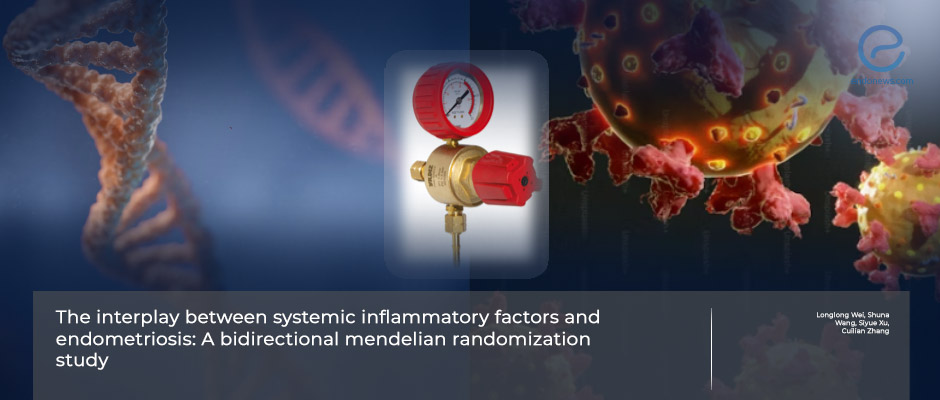Causal links between inflammatory regulators and endometriosis phenotypes
Jul 30, 2024
New study links inflammatory factors to endometriosis risk using advanced genetic analysis
Key Points
Highlight
- Specific systemic inflammatory factors, such as MCP1 and IL12p70, as potential initiators of endometriosis are identified, while factors like IL4 and GCSF are implicated in disease progression.
Importance
- The understanding of the causal relationships between systemic inflammatory factors and endometriosis is increased, potentially leading to more targeted and effective treatments.
What’s done here
- This is the first bidirectional Mendelian randomization study to explore the relationship between 41 systemic inflammatory factors and the likelihood of endometriosis.
- It identified several inflammatory factors that may play roles in either initiating or progressing endometriosis, providing insights for potential new treatments and research directions.
Results
- 20 causal relationships involving 18 systemic inflammatory factors were identified.
- MCP1, MIP1a, GCSF, MIF, IL4, IL5, IL8, IL9, IL12p70, IL16, and IL17 were shown to be the possible upstream factors of endometriosis.
- Key inflammatory factors like MCP1, IL12p70, and IL5 were causally linked to various endometriosis phenotypes.
- Endometriosis phenotypes also influenced some inflammatory factors, such as EOTAXIN and IL18.
Strengths and Limitations
- The study's strengths included using powerful genetic IVs and a less strict significance threshold to identify additional associations.
- The limitations included reliance on blood-based inflammatory factors rather than direct lesion data, the cumulative effect of lifetime genetic predisposition, and insufficient data on endometriosis severity and symptoms
Lay Summary
Endometriosis is believed to be polygenic and multifactorial, involving processes such as angiogenesis, immune responses, hormonal changes, and progesterone resistance. Inflammation is suspected to play a crucial role in its development, potentially creating a microenvironment that supports ectopic endometrial tissue growth. However, the exact relationship between systemic inflammation and endometriosis is still uncertain. While aberrant inflammation is linked to the development and progression of endometriotic lesions, small sample sizes, and confounding factors have prevented establishing a causal relationship.
Wei et al. from Zhengzhou, Henan, China conducted a study aiming to investigate the link between systemic inflammatory factors and endometriosis, clarifying the sequence of events in the disease's development. The study was published in the June 2024 issue of The Journal of Reproductive Immunology.
They used a novel approach called Mendelian Randomization (MR) by using genetic variants as instrumental variables to study causation, potentially reducing confounding and reverse causation issues found in previous observational studies. Genetic data from large genome-wide association studies were analyzed, selecting specific genetic variants associated with inflammatory factors and endometriosis. Various MR methods were employed, including inverse variance weighted and sensitivity analyses, to ensure robust and unbiased results.
They identified 20 causal relationships involving 18 systemic inflammatory factors, revealing that MCP1, MIP1a, GCSF, MIF, IL4, IL5, IL8, IL9, IL12p70, IL16, and IL17 may be upstream factors of endometriosis. Lower levels of IL16 and higher levels of MCP1 were linked to increased risks of general endometriosis. Higher IL12p70 levels were associated with an increased risk of ovarian endometriosis, while higher IL5 levels were linked to Fallopian tube endometriosis. Inflammatory factors like IL8, IL9, IL4, GCSF, and MIF also showed significant associations with specific endometriosis types. The reverse MR analysis revealed significant associations between endometriosis phenotypes and inflammatory factors such as EOTAXIN and PDGFbb. Sensitivity analyses confirmed the robustness of these findings. The authors discussed that endometriosis involves both pro- and anti-inflammatory responses, with a predominance of Th1 responses over Th2.
In conclusion, the findings indicate several systemic inflammatory factors may initiate endometriosis, while others are involved downstream in disease progression. The importance of considering these interactions in future studies to develop potentially effective treatments for endometriosis is also emphasized.
Research Source: https://pubmed.ncbi.nlm.nih.gov/38986231/
endometriosis Mendelian Randomization inflammation

